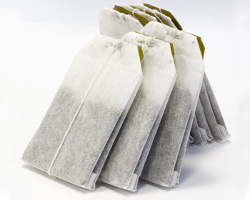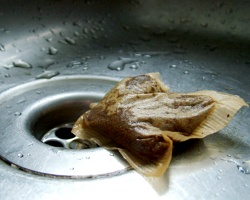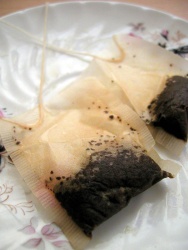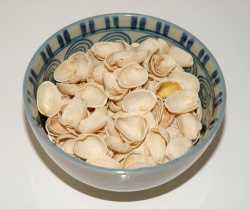Composting teabags
 Over on the Really Good Life the other day, I listed all the consumables I used in one day and their packaging. I think it’s easy to become blind to things you routinely use and listing them helped me realise where I was creating unnecessary waste/exposing myself to unnecessary synthetic chemicals in my day to day life. I’m going to do the exercise again a few times over the next couple of weeks to get a more accurate broader picture (for example, on the first day, I didn’t do any household cleaning or laundry, or much cooking).
Over on the Really Good Life the other day, I listed all the consumables I used in one day and their packaging. I think it’s easy to become blind to things you routinely use and listing them helped me realise where I was creating unnecessary waste/exposing myself to unnecessary synthetic chemicals in my day to day life. I’m going to do the exercise again a few times over the next couple of weeks to get a more accurate broader picture (for example, on the first day, I didn’t do any household cleaning or laundry, or much cooking).
The reason I’m mentioning it here is two-fold — firstly, I thought it was a useful exercise and I’d recommend it anyone wanting to reduce. Secondly, I categorised my teabags as “probably not compostable” so possibly destined for landfill, which caused a bit of discussion in the comments (we do actually compost our teabags but not without a little hesitation). As I mentioned over there, Alice in Blogland looked into the issue a few years ago and found that teabags often include synthetic material in the heat sealed bit – the paper bag and the leaves are but not everyone wants synthetic materials in their compost heap. Without the heat sealed bit (typically food grade polypropylene), the bags wouldn’t stay sealed during manufacture and use.
It’s four years since Alice’s research though and the corporate world has made many green(washing) steps forward since then – so I thought it might be useful to check the situation again. I contacted ten tea companies and asked them whether I could compost their tea bags. Here are the responses:
Tetley
Tetley got back to me very, very quickly – which makes me think they get asked this question quite a lot:
The material used to make the actual tea bag is a mixture of mainly cellulose fibres and a small amount of polypropylene fibres to give the heat seal. Under normal composting conditions the cellulose fibres will break down, as will the tea, leaving the very small polypropylene fibres which are normally so small they are not seen. It does however take a reasonable amount of time to do this and really needs to be placed into a ‘proper’, established compost heap.
If it has not broken down it may be because:
- It has not been left long enough
- It hasn’t spent enough time at the centre of the heap where the temperature is higher
- It has been put on the garden, not on a compost heap
- It hasn’t been mixed with enough vegetable or organic matter
- The worm population is not high enough
The packs themselves are not compostable. We are working with our packaging suppliers on an ongoing basis as they are currently unable to supply us with fully biodegradable packaging that we can use for our packs. Comments like yours actually help us keep the pressure on our suppliers to produce a solution.
Taylors/Yorkshire
Taylors, who make Yorkshire tea as well as their own “Taylors of Harrogate” brand, say:
I can confirm that our teabag paper is layered up in several layers. One side of the paper incorporates a very thin web of a meltable plastic (polypropylene). …
We advise our customers that they can compost our tea bags. Legislation says that provided an item is 95% degradable, then it is classed as
compostable. The amount of polypropylene in teabag paper is much less than this, so from a legal point of view teabag paper is compostable. Basically polypropylene is inert and does not react with or damage plants or animals. There is some argument that says that polypropylene
fibre can help soil bind together and aid water retention in soil, but the amounts of polyprop that you would compost via tea bags would really not register in a typical garden.My colleagues who are keen gardeners report that, with a good, healthy compost heap, our tea bags compost in around a year or so. One suggestion that we often give is to use them in a pot on top of crocks and underneath the soil to aid drainage.
Whittards
Whittards say:
We are pleased to inform you that the teabags are compostable.
Twinings
Twinings say:
I can confirm that our Teabags are decomposable, however if you purchase our envelope teabags you will have to tear off the staple and string*. Also it has been made aware to us here at Twinings that our teabags compose better when they are split.
(I’m wondering if that means that the string is synthetic rather than cotton…)
Clipper
Clipper say:
… The Clipper products that contain square/standard tea bags use unbleached paper that is composed of plant and wood fibres and a low level of polypropylene …
Clipper products that contain ‘String & Tag’ tea bags, use tea bag paper as detailed above, but without any plastic/synthetic fibres. …
Clipper teabags are suitable for inclusion in compost heaps where the wood and plant fibres will break down. Any remaining fibres will be so small that they cannot be detected and will disperse in the soil.
Yogi
Yogi, who make a lot of herbal teas, say on their website that they use:
100% oxygen bleached paper bags, sewn with pure cotton strings and stapled with inert metal … then individually packed in heat-sealed envelopes
Tazo
Tazo also make different herbal teas and they say they use:
oxygen-whitened hemp cellulose [fastened with] food-grade aluminium staples
London Tea Company
The LTC say their “boxes and pouches” are “biodegradable” – I’m not sure if “pouches” means the bags or envelopes for individually wrapped bags though.
No response yet
- PG Tips – no response
- Typhoo – no response
Conclusions
 All the “heat sealed” bags I looked into use polypropylene – which will usually break up (rather than break down) in a good compost heap. I think it comes down to the individual on whether they want those fibres in their resulting compost – a single bag might not have much in it but you know what us Brits are like, I think our compost heap is 50% tea bags (…only a slight exaggeration). Polypropylene is classed as “low to moderate hazard” by the Environmental Working Group in the US but there have been reports of polypropylene containers leaching chemicals which have “potent effects on enzymes and proteins“. Teabags would only add a low amount of that “low to moderate hazard” into a compost heap but still, some people may choose to avoid it.
All the “heat sealed” bags I looked into use polypropylene – which will usually break up (rather than break down) in a good compost heap. I think it comes down to the individual on whether they want those fibres in their resulting compost – a single bag might not have much in it but you know what us Brits are like, I think our compost heap is 50% tea bags (…only a slight exaggeration). Polypropylene is classed as “low to moderate hazard” by the Environmental Working Group in the US but there have been reports of polypropylene containers leaching chemicals which have “potent effects on enzymes and proteins“. Teabags would only add a low amount of that “low to moderate hazard” into a compost heap but still, some people may choose to avoid it.
There is a similar choice with stapled gusset bags – they don’t need the polypropylene but some people might want to remove the staple (I do a lot of …soil fondling with my hands and I’m not sure I’d like to come across lots of sharp staples in the soil).
Loose tea obviously side steps these issues – reducing the amount of resources used in the first place and the amount of waste that need dealing with after use (particularly compared to individually wrapped bags). You can get reusable metal infusers in different shapes and styles if you want a tea bag experience rather than using a pot/strainer.
Do you compost your tea bags? Have you had any problems composting them? Do you avoid them because of the resources/waste?
























I drink Twinings and always compost the spent tea bags. I share them between my wormery and the normal compost heaps and they break down fine. When sieving the compost you can get bits of bag that haven’t broken down which I put into the new heap. The packaging from Twinings is also fully compostable, even the foil wrapper that the bags are packaged in, so there is no need to throw of it away.
I contacted Celestial Seasonings and Bigelow tea companies, and so far I’ve one response from Bigelow:
Thank you for contacting us here at Bigelow Tea. You asked if the tea bags and string are compostable and what are the tea bags made of.
The tea bag is 100% biodegradable, we are please to share the fact that:
Bleach Free and Dioxin Free
Wood used in our filter comes from managed forests that subscribe to the Certified Sustainable Forestry Initiative (SFI)
Our Abaca Fiber suppliers adhere to Fiber Industry Develop Authority (FIDA)
Both soft woods and the Abaca are 100% sustainable.
The string is 100% cotton it is harvested from individually owned farms and cooperatives.
Cotton is a natural, sustainable product.
The paraffin used on our string is biodegradable and non-toxic.
I compost my Lipton tea bags, string, staple and out paper wrapping. I compost in two ways:
1. Instant – place tea bag, and out paper wrap torn in smallish pieces in the blender with other kitchen veggie scraps and cooking water and blend to a slurry. The string is cut into 1-1/2″ pieces and added. Dig a shallow trench in the garden, pour the slurry in, cover – 2 days and it’s all gone.
2. Dig a deep hole – 6-10″ deep – add the kitchen veggie scraps and tea bags prepared as above, cover and in 4-5 days it’s gone.
Have done this for years -over 15 – about half in CT where we have cold weather and here in FL where we don’t.
I have been composting our teabags for some time but I cheat! We have city-picked up compost which allows you to put almost anything in. The compost is heated and raked through with machines and I’ll suspect they do a better job getting things to degrade than I did as a lazy backyard composter.
we dont often use tea bags – but the ones we do use (when we use them) compost quickly and leave no trace – it might be that we use bokashi in our composting “cycle”? And we have a large worm/buggie population in the compost bin so this might also help.
I don’t often use tea bags (I prefer loose tea), but I and my hubby love the apple cinnamon tea from Celestial Seasonings.
They don’t have any string or staple in the bags, just the minimal bag, in any of the tea flavors of theirs I’ve ever tried. I’ve composted those, and they compost well.
My last test in reusing those tea bags is in a plant pot where I grow salad, a lawyer of 1/2″ around 1-2″ below the surface. That helps keep moisture for the plants. Sort of crucial when the temperatures are already 98 F / 37 C around here.
I think the issue of tea bags needs to be addressed to hotels, malls, restaurants, means of transport…it is there that primarily tea bags are used.
I do compost my teabags (Twinings everyday) & haven’t had a problem with them, but I really wish they would re-introduce the loose tea. I am incredibly fussy about tea and this is the one that I like. I have tried many, many others and have wasted a small fortune because I don’t like them so won’t use them, even taking them to work is no good, because they won’t get used there either,
Yes bring back twining everyday loose tea! ..
Wow… I’m into composting (I make Hot Composting Bins), but I’ve never come across so much well researched info on tea bags – great stuff
My pyramid bags (PG) survive longer than circular type (wife uses decaf). You will also see slower results if you cold compost (most bins in UK) as opposed to hot compost ie bins/heaps that get to 60C.
Personally, I do not worry about the TINY quantities of PP fibres in soil from tea bags. VAST quantities of these plastics are all around us (clothes, containers, packaging). Small fibres will get mixed with humus and help with soil structure. As for US concerns on leaching… personally I’d ignore it. Bags will use food grade plastics and unlikely to have any dyes/nasties. (They would leach in boiling water and we’d drink them. Also almost all these chemical are broken down in composting – it’s just the polymer plastic that resist decay.
Another more serious problem (than the effect of the bag) is the excess liquid (much caused by tea bag waste) in landfill. If not well managed this anaerobic liquid turns to a deadly soup called leechate. When this gets into the ground water it causes serious environmental damage and costs loads to drain off and deal with.
So please simply do what I do and USE LOOSE LEAF TEA wherever possible and chuck the old leave in the compost or straight on to the garden. The soil and earthworms love this. Problem solved, a win -win!
Try Waitrose Dargeeling – cheap, nice big leaves and tastes fantastic. You won’t regret it. Don’t forget to allow 4 mins to brew though – oh and you might want a tea strainer.
I would have thought if you are happy to actually drink tea made with these things then the risk of putting them in the compost is negligible!! I’m sure tiny bits of polymer could come off in during the process of being immersed in boiling hot water and swished around?
Tea bag suppliers never suggest to keep any form of consumable in open. They always ask to keep tea bags in air tight boxes and jars if you count aroma as a major qualities of tea to make you refreshing.
Guys – perhaps we need a campaign to name and shame those manufacturers whose teabags which aren’t 100% biodegradeable. My compost always comes out with little round skeletons of polypropylene which I have to pick out by hand.
I compost my teabags and havn’t noticed residues, they seem to break down ok, and I am aware of the material composition of tea bags in general.
What I would really like to know is,
WHAT ARE THE METAL STAPLES MADE FROM?? and what is the effect (other than flavour) of this metal being steeped in the tea we are drinking……..?
New research shows that composts containing biodegradable plastics may hinder rather than help plant growth, (recent study by university scientists in Poland). These findings have implications for waste management practices within the EU.
Source: Kopec, M., Gondek, K., Baran, A., (2013) Assessment of respiration activity and ecotoxicity of composts containing biopolymers. Ecotoxicology and Environmental Safety. 89 (2013) 137-142. DOI: 10.1016/j.ecoenv.2012.11.021.
I have always wondered about my wormeries which run mainly on tea bags. Microplastics in the environment are going to be more widespread as the result of my composting!
Sadly!
Aha, I’ve just emailed Taylors but then I saw this. I will post again if what they say has changed in the last two years. I was using Typhoo up to recently but switched to Yorkshire Tea (Taylors) more recently. The Typhoo don’t break down well and as my domestic compost heap is largely tea and coffee supplemented with a tiny amount of prunings and veg peelings I’d rather not have the polypropelene, however small. Yorkshire Tea has a loose leaf variant so I’m thinking of using that even though it’s less convenient.
I got my reply back from Taylors and they said similar to above, save that the percentage is 25% polypropylene. However inert and harmless the fibres are supposed to be, I’d still rather switch over to their loose tea and have easy composting.
I think all the above comments are spot on but plastic is a man made substance and how ever small does not belong in the soil. The problem is that after generations of adding little bits of unnatural product to the environment this will end up disturbing the natural balance. May be not on our life time but at some point it will. How ever there is another very useful way to use used teabags and that is to make firelighters from them and in this case all that is left is a small amount of ash that is much better for soil conditioning as the ash is a pure mineral supplement.
Much better. I understand that there is a company that recycles used teabags under the protection of a patent and they are suppose to be much better than your standard brands of firelighters. Would you consider this type of use for a used teabag if asked to recycle used teabags?
I make loosely packed compost heaps, covered with black plastic. They take 1-2 years to fully compost. (I’m not in a hurry and have 2 heaps going). The teabags never really break down. I have recently taken to emptying the bags out and putting the tea (herbal) on the compost and the bags in the waste bin. I use M&S, Twinings, Pukka, Yogi… lots of different ones.
I emailed Tazo custom support today for an up date answer about the compostable nature of Tazo tea bags. Here’s their response:
The nylon filterbags previously offered in our company-owned retail stores are neither biodegradable nor compostable (this includes the string and the tag). However, the tea itself is biodegradable.If you wish to compost your tea can tear open the sachet and compost the tea leaves and botanicals where composting services are available.
The cellulose hemp bags sold in grocery locations are compostable and biodegradable. However, the aluminum staple used to close the bag may or may not be, depending on your point of view. A bit more explanation follows: Different cities have differing rules for composting. For example, in Portland you can leave the staples on filterbags because they are such a small portion of the material being composted. It is likely that other cities have differing rules for composting. You might want to check with local waste management companies if the product is being picked up for composting.
Which (if any) recycling bin can I place my discarded Bigelow outer wrappers?
Can anyone (UK based) recommend a brand of loose-leaf tea that doesn’t come in a plastic bag? My personal favourite is Yorkshire tea (Taylors) but that does come in plastic. Up until now I’ve been using tea bags but I want to switch now I’ve learned about plastic in the tea bags (trying to pursue a reduced plastic lifestyle). Thanks in advance!
Hi everyone,
What great research you’ve done on all this. I have written to PG Tips to ask if there has been any change to the composition of their bags. I don’t think so from what I have read, but their online answers have been confusing, or obscure, so that it is not easy to figure out how much of their bags contain plastics and/or are coated with nasty chemicals.
Has anyone got updated information (as of 2017)?
I may just have to accept that I will have to switch to loose leaf.
Let the teabag dry out and then split it open & drop leaves in compost
Hi Guys, what a great quantity of research you have all done thank you.
We have just started to manufacture our own teabags and in order that we make sure we give people the correct details I have been researching this subject (It’s a mine field) We are using PLA this fabric is said by most tea companies that use it to be 100% biodegradable and it has become a bit of a buzz word in packaging.
My findings and concerns are that PLA is compostable but only under certain conditions I was wondering if anybody on this forum has managed to do that at home with PLA? (generally silk like tea pyramids) incase your not sure.
Best Regards
Justin
Anyone know the spec for tesco tea bags? They`re crimped so i presume some plastic. I don`t want to be drinking it or composting it even if it is invisible, + i presume it gets into the food chain via worms, birds & we`ll end up eating it. I heard the small fibres are in fish flesh!?- so therefore our flesh?. PLA sounds like it might be ok – wiki:- basically bio polyester, degrades to harmless lactic acid… if that is all.
They will have plastic in, PLA also has some issues once you look into it the only real solution is loose leaf.